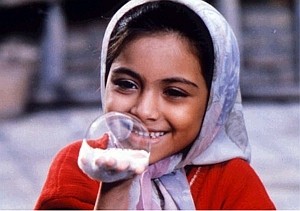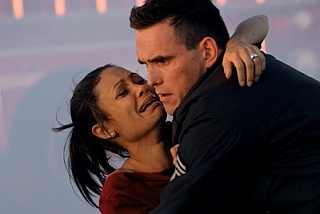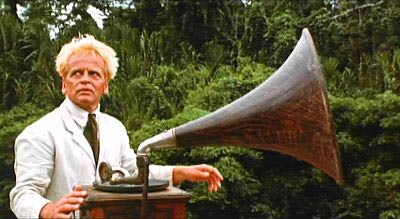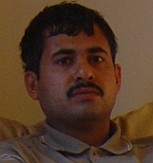Children of Heaven
Today I watched the Iranian film Children of Heaven directed by Majid Majidi.
The film is the story of two children, Ali and Zahra, from a poor Iranian family. In the beginning of the film, we see Ali getting his sister's shoes repaired from a cobbler. He goes to a vegetable shop after that, and keeps the shoe-bag in a corner of the shop. A man collecting garbage takes the bag away mistaking it for garbage, and Ali returns home with a broken heart. Zahra cant go to school as her teacher would beat her if she comes without shoes. They cant ask their parents for a new pair of shoes, as they know that their father cant afford to buy one, and they may get a scolding for losing the old shoes. So, what should they do?
Ali proposes a solution - He asks Zahra to use his shoes. They are bigger for her feet, but she somehow manages to use them. Her classes finish earlier, and after the classes, she runs to Ali, who takes back his shoes and runs to his school. Ali is always late in school as a result of this, and the headmaster of the school catches him almost everyday. As days pass, Zahra finds another girl in her school wearing her pink-colored shoes; She follows that girl and locates her house. After some time, she comes back to the house again, with Ali to accompany her, but seeing that the girl's father is a poor blind man, the children return to their home silently. After few days, Ali sees a notice in his school, about a marathon race for children. The third prize is a pair of sneakers. He joins the race, hoping to win the sneakers for his sister. In the end, we see a disappointed Ali coming back home, as he won the first prize instead of the third, and there is just a trophy for the winner - no sneakers. But we, the audience know that his sister would soon get a footwear, as we are already shown their father cycling to home with a pair of new shoes in his bag.

Children of Heaven shows us how a simple story can be told in a brilliant and touching way. In the world of the children, the missing shoe is the most important thing. Both Ali and Zahra constantly think about it, and the girl especially finds her eyes wandering on the feet of her classmates when she walks in the school compound. However, in spite of their "tragedy", simple things of life still don’t fail to amuse them, like making bubbles out of soap. The affection between the brother and sister is shown in a moving way, reminding of scenes from Pather Panchali - Zahra finishes her exams early, as she knows that her brother would be waiting for her in the street, to collect the shoes and run to his school. Once, Ali gets a pen as a gift from his teacher, and he presents it to his sister to see the smile on her face. Through few sequences depicting search for a part-time job, the director also shows us the warmth of the relationship between father and son. The fact that the parents are actually loving and kind-hearted, and their children and struggling to hide their little secret from them, makes the story even more touching.
The acting performances of the children are excellent, and they have fully absorbed the pleasures and sorrows of the characters they play. The background music is minimal, and the camera is used to just show us what is needed. It was a beautiful experience watching this film.
The film is the story of two children, Ali and Zahra, from a poor Iranian family. In the beginning of the film, we see Ali getting his sister's shoes repaired from a cobbler. He goes to a vegetable shop after that, and keeps the shoe-bag in a corner of the shop. A man collecting garbage takes the bag away mistaking it for garbage, and Ali returns home with a broken heart. Zahra cant go to school as her teacher would beat her if she comes without shoes. They cant ask their parents for a new pair of shoes, as they know that their father cant afford to buy one, and they may get a scolding for losing the old shoes. So, what should they do?
Ali proposes a solution - He asks Zahra to use his shoes. They are bigger for her feet, but she somehow manages to use them. Her classes finish earlier, and after the classes, she runs to Ali, who takes back his shoes and runs to his school. Ali is always late in school as a result of this, and the headmaster of the school catches him almost everyday. As days pass, Zahra finds another girl in her school wearing her pink-colored shoes; She follows that girl and locates her house. After some time, she comes back to the house again, with Ali to accompany her, but seeing that the girl's father is a poor blind man, the children return to their home silently. After few days, Ali sees a notice in his school, about a marathon race for children. The third prize is a pair of sneakers. He joins the race, hoping to win the sneakers for his sister. In the end, we see a disappointed Ali coming back home, as he won the first prize instead of the third, and there is just a trophy for the winner - no sneakers. But we, the audience know that his sister would soon get a footwear, as we are already shown their father cycling to home with a pair of new shoes in his bag.

Children of Heaven shows us how a simple story can be told in a brilliant and touching way. In the world of the children, the missing shoe is the most important thing. Both Ali and Zahra constantly think about it, and the girl especially finds her eyes wandering on the feet of her classmates when she walks in the school compound. However, in spite of their "tragedy", simple things of life still don’t fail to amuse them, like making bubbles out of soap. The affection between the brother and sister is shown in a moving way, reminding of scenes from Pather Panchali - Zahra finishes her exams early, as she knows that her brother would be waiting for her in the street, to collect the shoes and run to his school. Once, Ali gets a pen as a gift from his teacher, and he presents it to his sister to see the smile on her face. Through few sequences depicting search for a part-time job, the director also shows us the warmth of the relationship between father and son. The fact that the parents are actually loving and kind-hearted, and their children and struggling to hide their little secret from them, makes the story even more touching.
The acting performances of the children are excellent, and they have fully absorbed the pleasures and sorrows of the characters they play. The background music is minimal, and the camera is used to just show us what is needed. It was a beautiful experience watching this film.



